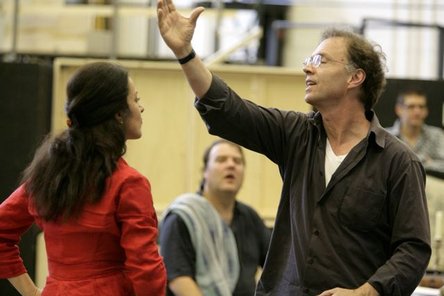Over every operatic collaboration an occasional hush must fall. Work is proceeding apace on The Letter, but Paul Moravec and I don’t have anything to do with it. The Santa Fe Opera is busily planning the July 25 premiere of The Letter, which goes into rehearsal on June 29. Meanwhile, Paul and I are working on various publicity-related activities that will take place between now and then. I’ll be flying to Santa Fe on July 13 to attend the last two weeks of rehearsals and make any last-minute changes that might prove necessary. For all intents and purposes, though, my work is done. From here on out, the responsibility for getting The Letter on stage belongs to the cast and the production team, not the librettist or composer. It’s up to Jonathan Kent, the director of The Letter, to figure out how best to bring my words to life, in the same way that it was up to Hildegard Bechtler, the designer, to create a suitable setting for them.
Even if I were in a position to stick my nose into Jonathan’s business, I wouldn’t do so. I’m a writer, not a director, and it’s his task, not mine, to move The Letter from the page to the stage. Of course I have strong opinions about how The Letter ought to be staged, but they’re fully embodied in my libretto, which Jonathan shows every sign of taking seriously. He discussed the opera with Paul and me last November, and we soon discovered that the three of us were all on the same page: The Letter is a melodrama, and that’s how it ought to be played.
 When Jonathan directed Angela Gheorghiu in Tosca at London’s Royal Opera House in 1996, he gave an interview to the BBC in which he talked about the opera’s dramaturgy:
When Jonathan directed Angela Gheorghiu in Tosca at London’s Royal Opera House in 1996, he gave an interview to the BBC in which he talked about the opera’s dramaturgy:
What I admire about it, quite apart from the thrilling music, is its theatre craft. It’s a taut, sinewy melodrama, exquisitely put together. There isn’t an ounce of flesh on it. Puccini stripped the play down until it was an unstoppable arrow. That’s what interested me: to find a way within that hurtling narrative to examine the relationships and its themes of sex, power and death.
Those words were music to my ears.
The only suggestion that I offered to Jonathan was that I thought the first production of The Letter ought to be played relatively straight. “I don’t think it makes a lot of sense to superimpose any kind of high directorial concept on a brand-new opera,” I told him. “It’s not like we’re doing a piece like Carmen that everybody already knows. I imagine the production as being fairly naturalistic–but in a heightened, poetic way.” He agreed, and that was that.
Do I expect to be surprised by what I’ll see for the first time on July 13? You bet. The whole point of working with a director like Jonathan is to let him surprise you instead of trying to second-guess him at every twist and turn. Just as I couldn’t begin to imagine what Hildegard’s set would look like before I saw the scale model, so am I incapable of envisioning how Jonathan will set the cast of The Letter in motion and help them develop their characterizations. That’s his job. Of course I’ll put in my two cents’ worth if invited to do so, but I wouldn’t dream of meddling, any more than I’d give unsolicited interpretative advice to Patricia Racette, the star of The Letter. To be sure, Pat has questioned me in the closest possible detail about the role of Leslie Crosbie, and I’ve told her what I think about why Leslie does what she does. In the end, though, it’s her job, not mine, to turn Leslie into a living, breathing creature whose onstage behavior makes dramatic sense, and I haven’t the slightest doubt of her ability to do so.
All of which means that after two years of intense and unremitting creative activity, I’ve dropped the reins and stepped back from The Letter. Now I’m simply going to let it happen–and I can’t wait to see what it becomes.
